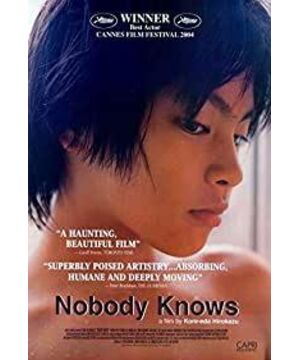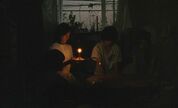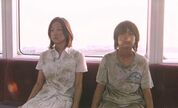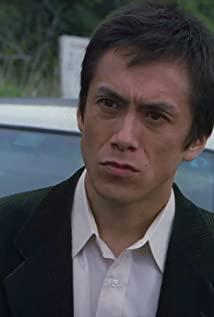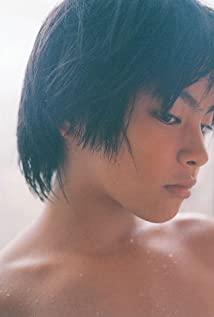Mother: Keiko Fukushima, with golden brown fluffy hair, a girly dress, and a slightly sweet voice. However, no matter how perfect these external beautifications are, they cannot hide the marks left on her face by the years. She always came home late and had a habit of drinking too much. She gave birth to four children with different men in the past, but she is still full of fantasies about love.
The film does not use deliberately critical lens language, but presents such a mother role in multiple aspects. Cameras often capture close-ups of children's faces as they listen to Keiko's speech. Through the eyes of the children, the audience can feel the love between them. When she is with the children, the picture is always cheerful and warm. She cuts the children's hair, plays games with them, and eats soba noodles together.
Some of Keiko's actions are selfish, but she also loves children. In the film, there is a scene that is more directly reflected. In the early morning, a ray of light seeped into the window, and Ming (the eldest son) looked sideways at Keiko in his sleep. At this time, the camera gave Keiko a close-up of her face, and a tear fell from the corner of her eye. Immediately afterwards, Keiko woke up, got up and stretched. Here Keiko has her back to the camera, and the audience cannot see her expression. It made the meaning of tears blurred and profound, why did she cry.
Eldest son: Akira Fukushima, twelve years old, well-behaved and reserved, sensitive and sensible. After his mother left home, he took on the burden of taking care of his younger siblings.
The film uses a lot of contrast to portray Ming such a special child. For example, at the beginning of the film, the family has just moved to a new house, and the mother Keiko goes out to work, leaving the children at home. In the evening, the sensible Ming took a long lady's purse that was bigger than his small hand, ready to go out to buy ingredients for dinner, as well as the Apollo chocolates that his sister Xiaoxue asked for. Passing a section of climbing stairs, Ming walked happily. On the other side of the stairs sat two students practicing the recorder. They looked as big as Ming. When Ming passed them, Ming glanced back and continued walking. This comparison implies that although Ming did not go to school, he is also curious about campus life.
Immediately afterwards, at the supermarket, Ming carefully selected the fruits, picked up the persimmons and said to himself, "Would you like to buy some persimmons?" Here, the older auntie in the background of the picture sets off the appearance of a sensible little adult.
He searched the supermarket and there was no Apollo chocolate, and then went to the convenience store and finally found it. So I bought it and got ready to go home. At this point, the contrast reappears. Ming walked all the way and remembered the names of the shops in the shopping street. Ming, who was alone, formed a sharp contrast with the bustling crowd. The family had just moved to this unfamiliar neighborhood. His mother was very busy, and he was the eldest son. He had to take care of the family, so he carefully memorized every corner of every road nearby.
Japan is a nation of fetishes. In the film, there are many depictions of objects, and people think of things and people, so as to set off the mood of the characters at this moment. For example, the thing that matches Ming is --?. Changes in convenience stores, ATM machines, account books, bills of arrears, etc. On the one hand, the development of the plot was promoted. As the economy became more and more difficult, the children's lives became more and more difficult. On the other hand, it is implied that Ming is under enormous financial pressure as a surrogate parent.
Twelve-year-old Ming also has the characteristics of other children of his age. He is full of curiosity about the world. He likes baseball, so he uses the red ball he found in the park and the frozen drink from his friend Saki as a tool to practice throwing. He likes electric games, and he will always stop for a long time after passing the video game city, and he is reluctant to leave. He wants friends, he wants to go to school... These common wishes are actually the common wishes of every boy of the same age, but for Ming, it is an extravagant wish.
In order to show the arc of the characters growing up. In the film, there are three stealing plots that present a relationship. From the first time when he was misunderstood by the convenience store manager as a thief, and portrayed Ming's goodness; to the second time when he was instigated by a bad boy, and portrayed Ming's evil; and then to the third time. In order to save his sister Xiaoxue, Ji had to steal, which portrayed Ming's courage. These three thefts show Ming's mental changes as he grows up, his good and evil, and his choices made him who he is, retreating from childishness and becoming more mature.
The eldest daughter : Kyoko Fukushima, quiet personality, likes the piano, very attached to her mother Keiko. Jingzi is always watching the time, waiting for Keiko to come home. But when Keiko left home, Kyoko hid in a closet with a mother's breath. In the middle and later stages of the film, nail polish becomes an important image to imply the emotional changes of Kyoko and Keiko, which symbolizes the existence of the mother in Kyoko's heart. When the nail polish on the hand changed from the initial bright to dull, and then to the knocked over nail polish bottle on the floor, finally, even the traces on the floor disappeared. Such a metaphor, on the one hand, implies the passage of time, and on the other hand, the fading relationship between Jingzi and Keiko.
Brother : Shigeru Fukushima, five years old, naughty personality, loves snacks. At the beginning of the film, the family has just moved to a new house, Ming is arranging tableware, Jingzi is arranging books, Xiaoxue is arranging toys, and Mao is watching TV and drinking Coke. But Shigeru also has his cute side. For example, the balcony is repeatedly depicted as an image of Shigeru's relationship with his mother, Keiko. For fear of being found by the landlord that the room was overcrowded, Keiko asked Jingzi, Shigeru, and Koyuki to only stay in the room, even the balcony. He restrained his mischief, abide by the agreement with Keiko, and never cross the balcony.
Sister: Fukushima Yuki, three years old, has a well-behaved personality, likes to draw, and is attached to her mother Keiko just like Kyoko. In the film, although Xiaoxue has few lines, there are many details that describe people with objects. One, crayons. From the beginning, it was completely new, and when she painted Saki later, Koyuki hesitated to pick up and put down the blue pen. The crayon appears multiple times, suggesting the passage of time.
Two, flower pots. In the second half of the film, Xiaoxue's flower pot is accidentally shattered, implying the subsequent change of Xiaoxue's fate. Three, luggage. It hints at the beginning and end of Koyuki's fate. At the beginning of the film, Keiko uses a suitcase to smuggle Xiaoxue into the room. At the end of the film, after Xiaoxue's accidental death, Ming and Saki use a larger suitcase to smuggle Xiaoxue to a place where the plane can be seen.
Mizuguchi Saki: Saki is the only friend of the four siblings. In the film, there are many contrasts between indoor and outdoor spaces. One side is the noisy outside world (streets, parks, schools, convenience stores, tram stops, etc.), and the other side is the warm inner world of the apartment. The contrast created by the use of space brings out the cruel living situation of the Fukushima family. To a certain extent, the intervention of the character Saki symbolizes the tenderness from the outside world. When Saki and the children become friends, it seems to imply some kind of hope.
After watching it a few years ago, it gave me a lot of shock. Rewatched it recently and found some new feelings. I am a Muggle movie lover qwq writing a film review for the first time, but I still want to record it~ The above are just some personal opinions, welcome to discuss and learn from each other~
View more about Nobody Knows reviews


